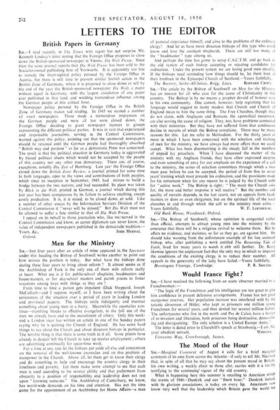LETTERS TO THE EDITOR
British Papers in Germany
SIR.—I read recently in The Times with regret but npt surprise Mr. Kenneth Lindsay's letter stating that the Foreign Office proposes to close down the British-sponsored newspaper in Vienna, Die Welt Presse. Since then the same journal reports that Die Welt Presse has been sold to the Socialist-owned publishing firm of Vorwaerts. It is apparently too late to remedy the short-sighted policy pursued by the Foreign Office in Austria. but there is still time to prevent similar foolish action in the British Zone of Germany, where it is proposed to close down or sell by the end of the year the British-sponsored newspaper Die Welt, a paper without equal in Germany, with the largest circulation of any paper ever published in that land, and wielding tremendous influence among the German people at this critical hour.
Newspaper policy pursued by the Foreign Office in the British Zone of Germany makes sad reading. In 1945 we started a number of overt newspapers. These made a tremendous impression on the German people and were all too soon closed down, the Foreign Office deciding to grant newspaper licences to groups representing the different political parties. It was in vain that experienced and responsible journalists, serving in the Control Commission, warned against this policy, pointing out that the sponsored newspapers should be retained until the German people had thoroughly absorbed " British way and purpose " as far as a democratic Press was concerned. The result is that the political situation in Germany today is aggravated by biased political sheets which would not be accepted by the people of this country nor any other true democracy. There are, of course, exceptions, notably Die Zeit of Hamburg. Last yea, the Foreign Office closed down the British Zone Review, a journal printed for some time in both languages, open to the views and contributions of both peoples, which since its inception in September, 1945, had striven to build a bridge between the two nations, and had succeeded. Its place was taken by Blkk in die Welt, printed in German, a journal which during this last year has been conspicuous by its failure to achieve anything, except costly production. It is, it is stated, to be closed down, pr sold. Like a number of other essays by the Information Services Division of the Control Commission it " never will be missed." But Die Welt must not be allowed to suffer a fate similar to that of Die Welt Presse.
I appeal on its behalf to those journalists who, like me,-bserved in the Control Commission and know, as career diplomats can never know, the value of independent newspapers published in the democratic tradition.—


































 Previous page
Previous page